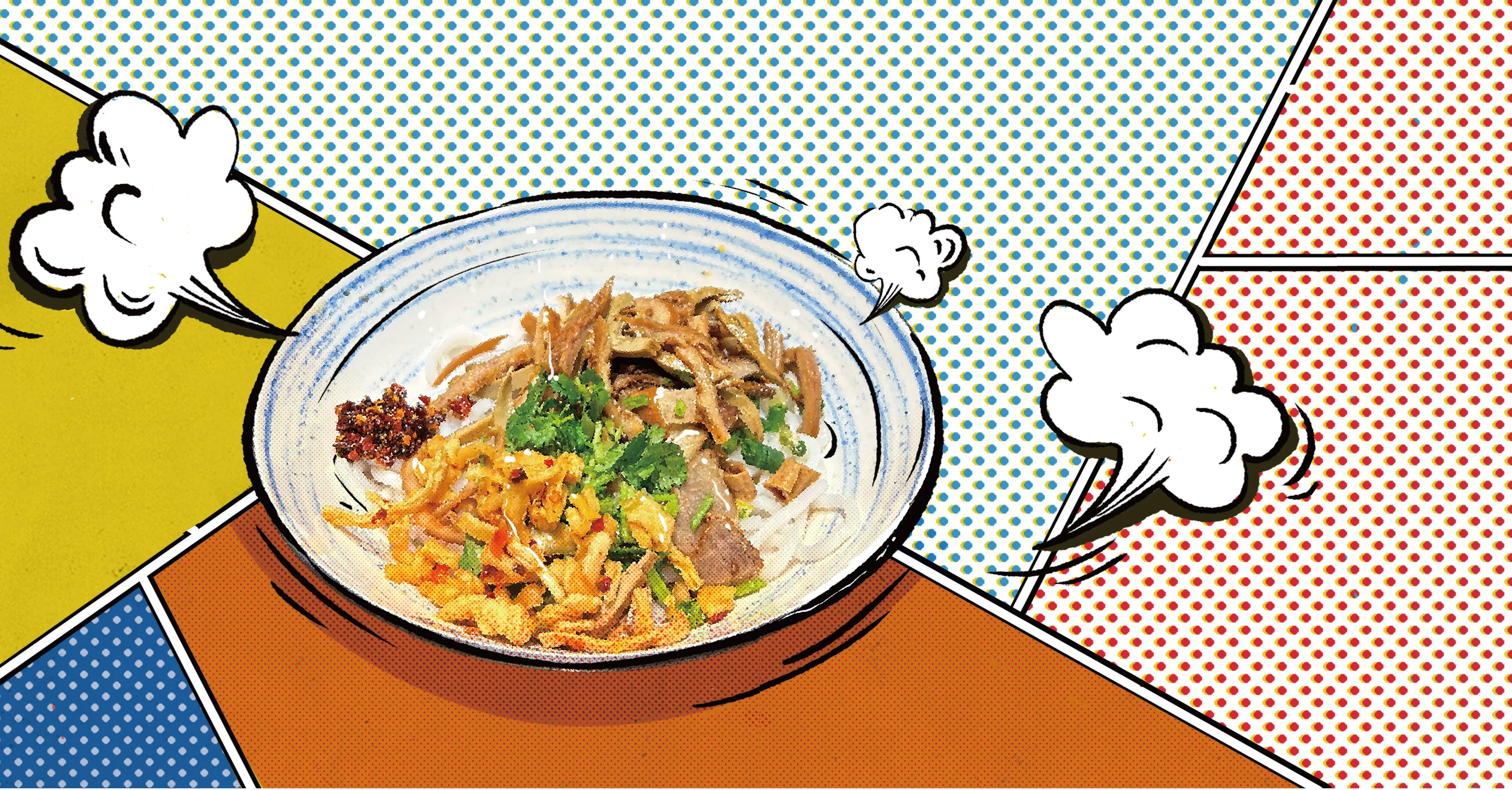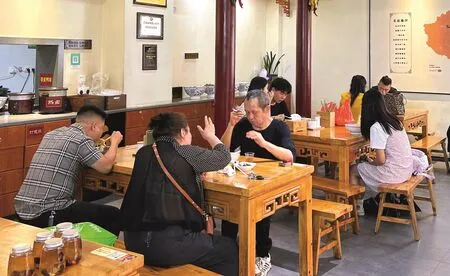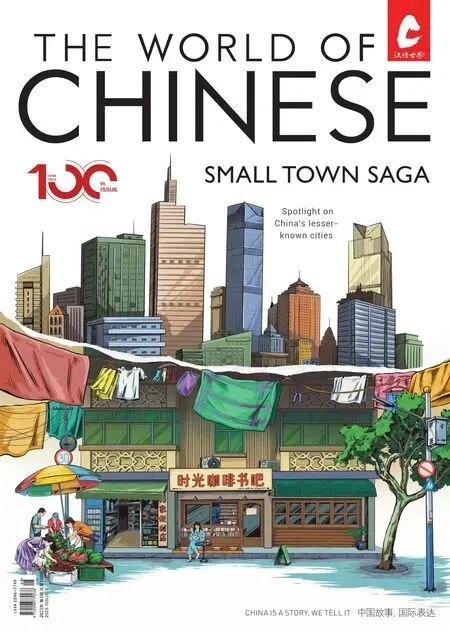Noodle Nostalgia
Text and photography by Tan Yunfei (谭云飞)

Illustration by Wang Siqi
Despite its short history, lufen has become a symbol of pride for Hengyang locals
源于桂林的卤粉,成了衡阳人的乡味
Lin Xi takes every opportunity she gets to visit her hometown, Hengyang, a city of 6.5 million people in central China’s Hunan province.Whether it’s a public holiday or just a regular weekend when she doesn’t have too much school work, Lin hops on the one-hour train from Changsha, the provincial capital where she relocated for college four years ago, to spend more time with family, reconnect with old friends, and most importantly, have a bowl of the local delicacy:lufen(卤粉, literally “brined rice noodles”).
Even though Changsha boasts around 6,000 rice noodle, orfen(粉), restaurants, Lin can’t find a bowl oflufen, usually made with a mixture of cooked rice noodles, master stock, and toppings like beef slices, that tastes just like home.“There aren’t so manylufenrestaurants in Changsha compared to Hengyang, and they’re different in a subtle way that I can’t explain,” Lin tells TWOC over a bowl of the stuff at Zizhulin, a famous locallufenchain near Hengyang Railway Station The restaurant is her first stop after getting off the train, and she has been coming here since she was a child.Despite not living in the city for the past four years, Lin still considers herself a regular at the restaurant.
Hengyang’s affinity forfenis not surprising,since rice noodles have enjoyed a long history in rice-planting southern China, dating back at least 2,200 years to the Western Han dynasty—“rice noodles in the south and noodles in the north (南粉北面),” goes a common saying.Archeological findings from that period reveal that the process of making rice noodles has stayed remarkably consistent over the years:grind the rice with a mill, cook it with a steamer—or azeng(甑) in ancient times—and finally cut it into thin slices with a knife.While rice noodle’s exact place of origin remains unclear, many provinces and regions in central and southern China, including Hunan, Jiangxi,Sichuan, and Guangxi, have claimed to be “the hometown of rice noodles (米粉之乡).”

The Zizhulin restaurant by Hengyang Railway Station is open 24 hours a day for traveling locals and tourists to have a taste of authentic lufen

The core flavor (and some would say soul) of lufen lies in the master stock, or lushui
Historically, Lin’s hometown Hengyang was better known for another kind of rice noodle dish calledtangfen(汤粉), a general term for rice noodles served with soup and various toppings such as minced meat, black fungus, and other vegetables.It was not until the 1990s thatlufenbegan to make its way into the local food scene as a staple breakfast food.Derived from Guilinstyle rice noodles of southern China’s Guangxi Zhuang Autonomous Region,lufenquickly gained popularity among Hengyang locals for its strong aromatic flavor thanks to the use of the master stock, orlushui(卤水), which is typically made by simmering pork and beef bones with a blend of spices and traditional Chinese herbs.Served with the addition of cooking oil, braised beef slices, and fried peanuts,lufenhas become a symbol of nostalgia for those born after 1980,including Lin who grew up eating the dish, despite its short history.
Under the thread “How does it feel like to havelufenin Hengyang?” on the online Q&A platform Zhihu,thousands of people who grew up in Hengyang have shared how much they miss the authentic Hengyanglufenand complained about rice noodles in other places.“I look forward to the Spring Festival and the National Day holidays every year so I can return to Hengyang and have as muchlufenas I want,” wrote one user under the handle Lei Wang.
Li Gaoxiang, the founder of Zizhulin,remembers opening her first store, the one that Lin still frequents, by Hengyang Railway Station in 1995.“The store was very small, only around 10 square meters.[We only prepared]around 100 bowls oflufenon the opening day and they all sold out,” Li says.Zizhulin was one of the city’s first restaurants to specialize in the delicacy and has now grown into one of the best-knownlufenbrands, with over 30 stores in Hengyang alone.
By the late 1990s, almost all the existing rice noodle restaurants had addedlufento their menus, according to Liu Xiaole, a Hengyang local in her 30s who wished to use a pseudonym for this piece.Liu recalls that, back in 1998,some stores even came up with a more affordable version oflufenfor middle school students like her by removing the beef slices.
The hype over the dish shows no signs of fading even now.In Qidong county, an hour’s drive from downtown Hengyang, Zhang Shuangqiao claims to have opened the county’s firstlufenshop 33 years ago with a recipe he brought back from Guilin.Even though his store is no longer in a prime spot (since the nearby railway station was moved to a different location in 2013), he still sells around 400 portions oflufenevery morning.
Qiu Yufang, anotherlufenrestaurant owner from Qidong county, attributes the popularity of the delicacy to its “strong flavor,” “quickness to serve,” and “easiness to package for takeaway and consumption in the summer, as it doesn’t contain much soup.”
Though some restaurants, especially those in counties and towns, still keep the “authentic Guilinlufen” part in their name and branding,most Hengyang people already considerlufenas part of their own local cuisine.
“People always tell me that they like to have a bowl oflufenwith the ‘hometown flavor’ before and after a trip.Many locals who grew up with our rice noodles bring their children here now as well,” Li, the Zizhulin founder, brags.
Li has made some tweaks to the original Guilin-style recipe: Herlufenis spicier and more aromatic so it caters better to the pallet of Hengyang locals.According to her, thelushuiused in her restaurants is made with 20 different spices and boiled for 24 hours to give it a richer flavor.
Over the last decade or so, business owners have also tried to bring Hengyanglufento a wider audience.Li tells TWOC that Zizhulin now has around 50 franchise outlets, some as far away as Guangzhou in Guangdong province.They’ve also set up a factory to produce packaged Hengyanglufenso more people can get a taste of the proud local delicacy without needing to visit a restaurant.
Qiu, who has opened fivelufenshops since 2017, is also planning to expand her business to Guangzhou, a city with many Hunan migrant workers but much lighter and less spicy local food.“We’ll localizelufenfor the people there.But it won’t be too light or it’s notlufenanymore,” she says.

Most rice noodle restaurants in Hengyang have a self-serving table with free pickles, chili oil, and other seasonings

